Featured image: Women over 50 are leading the way when it comes to travel | Photo by Meniphoto on Envato
Off-season travel is top strategy to save money on travel
By Carolyn Ray, Editor, JourneyWoman
There’s no question that women over 50 are a powerful force. In travel, as in life, we are decision-makers, influencers and role models. In April 2023, we invited JourneyWoman readers to participate in a survey asking about 2023 travel plans, preferences, pet peeves and money-saving tips. The response was impressive — over 750 women completed the survey within the first 48 hours, once again demonstrating the generosity and willingness of women to share their wisdom and advice with each other.
As promised, today we are sharing the results with you. Most of those who responded were from the United States (47%) and Canada (36%), and over 30 other countries including the UK, Australia, New Zealand, Mexico, and India. There were also women from Trinidad, Sweden, South Africa, Japan and Panama — showing that JourneyWomen are everywhere around the world. Ninety-five percent of those who took the survey are over 50, with the largest group being age 60 to 70. Five percent were over 80!
Why is all of this information important? Because we need to understand our power and influence as women. Women aren’t a niche market — we are leading the market. As the most important decision-makers in travel, we have an opportunity to help the industry adapt to our needs. Women over 50 are the most influential, empowered and affluent generation, yet our last study of Women Over 50 in Travel in December 2022 showed that 70% of women don’t feel seen or understood by the travel industry (of those, 43% said they felt ignored). This is an opportunity for the travel industry to build better relationships with women over 50 and align the types of travel experiences they offer with our needs, including safety and mobility.
Women leading the trend in off-season travel
Women are using a variety of strategies to save money to travel — with off-season travel at the top of their list.
In our survey, 48% of women ranked off-season travel as their primary way to save money, followed by looking for deals and discounts and longer stays. Planning further in advance, going to less-travelled places, using credit card points to redeem travel, and group tours were also popular choices.
In the off-season, there are less crowds, better prices for flights and accommodations, and less lineups at cultural attractions, museums, etc, resulting in a more authentic experience.
There are typically three seasons in travel. In the Northern hemisphere, peak season is usually June to August, shoulder season runs from April to June, and September to October. The off-season is typically November to March. This is reversed south of the Equator, where summer runs from December to February and winter in June, July and August.
What can destinations and tour companies do to meet the needs of women?
What women would like to see more of in the off-season:
- Reduce the single supplement
- Reduced hotel rates during the off-season
- Fully -refundable rates on tickets, hotel rooms and flights in the off-season
- Free or reduced rates for museums or attractions
- Easy-to-implement perks like complimentary breakfast
- Discounts for frequent travellers or repeat clients
- Discounts on public transit, or incentives for train travel instead of short-haul flights
- Provide drivers with vehicles for day trips and local excursions. We want to explore on our own but not drive on our own. We want to hire a person who knows the area and the driving regulations to take us for independent excursions like a day or half day
- Create unique experiences for off-season travel
- Show how they are ecologically and ethically superior….less fossil fuel, less exploitive
Safety is part of our decision-making criteria
When it comes to making travel decisions, women ranked safety as #2, demonstrating its importance. Women over 50 are also more likely to purchase travel insurance, with our survey showing that 67% of women purchase comprehensive health and trip cancellation insurance when they travel.
Our survey showed that 58% of women over 50 feel that mobility and accessibility is very or moderately important, compared to 42% who don’t.
Spending on travel
In our December survey, 96% of women said they are the primary travel decision makers in their household.
In this survey, most women (55%) spend between $1,000 – $3,000 a week on travel, and a large percentage (46%) spend between US$3,000 and $5,000 a week on travel. Multiply that by a preference for longer stays, and it’s obvious that spending by Baby Boomers and Gen X women far exceeds that of other groups, such as millennials or Gen Z.
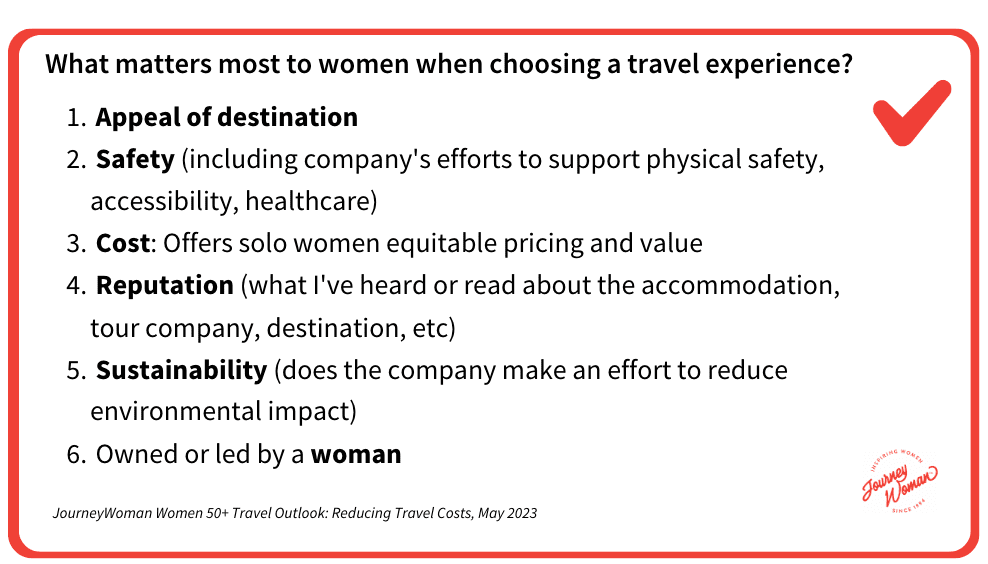
Highlights: What you said
Women are making up for lost time
With almost three-quarters (73%) of women planning international travel in 2023, our survey shows that women are making up for lost time.
This is our time to look after ourselves on our path to self-fulfillment, while being conscious of how we can travel authentically and sustainably.
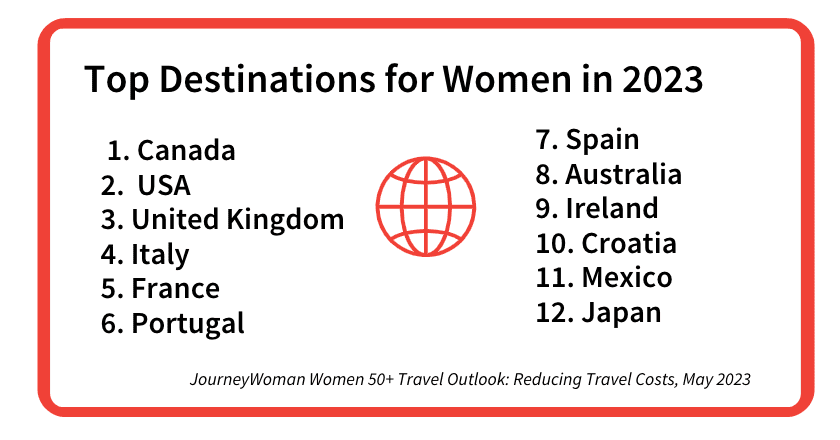
Women are travelling for longer periods of time
Women are planning to travel for longer periods of time.
In the survey, 81% of women said they were planning to travel more than two weeks per year. Compared to Americans, Canadians travel for longer periods of time, leading in the two month-plus category.
Longer trips can result in a lower per-week spend, particularly when you’re staying in one place, buying food at local markets and living as a local.
It also makes the high cost of airline travel more palatable. One of our money-saving tips is to find the most affordable flight possible and then use public transit to reach your final destination. This was my strategy in Europe during my three-month stay last year.
Women prefer to book their own travel
Women are savvy, self-directed travellers and prefer to book their own travel. Most book directly through hotel and airline websites rather than using aggregators like Expedia or Booking.com (although Booking.com is the most used).
Approximately 20% said they use a travel advisor, and 42% don’t, with 38% undecided. This may indicate an opportunity for travel advisors to better explain how they can help navigate change and uncertainty. (Read our article Six Reasons You Should Use a Travel Advisor.)
Women are booking further in advance, but most are still in a six-month window. Most women (39%) said they book travel between 4-6 months in advance, or 2-3 months in advance, indicating a readiness to take advantage of deals and discounts.
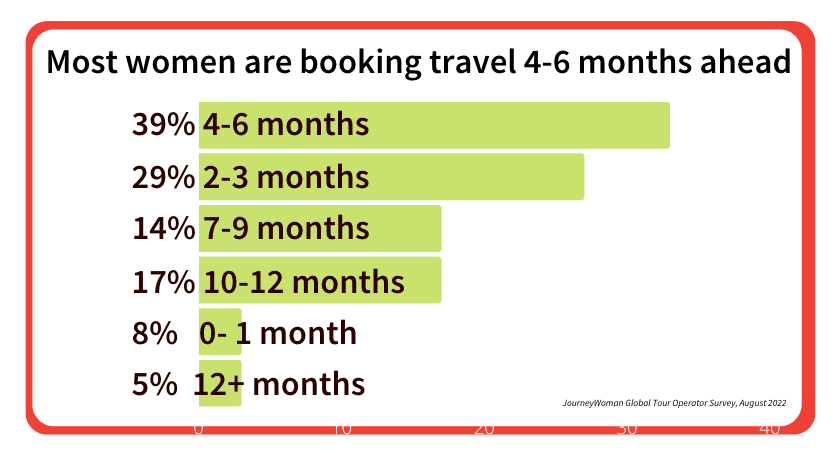
Most are planning to take at least one group tour
The majority of women (59%) are planning to take a group tour in 2023. of these, 33% will take one, and 26% will take 2 or more.
Tour companies have an opportunity to better communicate cost savings, as most meals, accommodation, guides, excursions and local transportation is generally included. Tour companies also get preferential hotel rates, and may be able to negotiate lower rates in the off-season, further reducing the cost of travel.
Visit our Women’s Travel Directory to find a women-friendly tour!
When it comes to saving money…
What’s hot
- Most women (83%) book directly through airline websites rather than using aggregators
- Most (70%) book directly from the hotel website
- Booking.com is preferred over Expedia for accommodation
- The best memberships for discounts include AARP, AAA/CAA
- Using Cash back and airline credit cards (eg AMEX) helps reduce costs
- Loyalty programs include airline and hotels (eg Aeroplan)
- Bonus tip: Use Global Entry and TSA to reduce wait times
- The single supplement, which ranks as the #1 pet peeve, ahead of airline costs/fees
- Most women (42%) don’t use travel agents, 38% said they might
- Priority Pass was mentioned the most as ‘not helpful’
- For flights, a small percentage use Priceline (2%) or Kayak (7%)
- For accommodations, the highest usage is Hotels.com (14%
Have a favourite place to stay? We’re testing a new Accommodations service where you can share your recommended hotels and long stays. Click here to share yours!
The single supplement is the #1 frustration with travel
It’s no surprise that solo women continue to be frustrated with the single supplement, ranking it their #1 pet peeve, ahead of airline costs. (The ‘single supplement’ is industry term which means that a woman travelling alone has to pay more to occupy a room that is usually occupied by two people.)
There are many ways to avoid paying the single supplement, but this is clearly an area of confusion.
Most women said they would pay more to have their own room, and many commented that they were not interested in sharing a room — ever. On the subject of roommate matching, there were over 300 comments along the lines of: “I don’t want to be matched with a stranger just to save money”, “I would not take a tour where I was paired with a roommate,” or “I am a quiet person who likes their privacy, and I would worry that a roommate might be louder than me and stop me sleeping.”
When it comes to the single supplement being charged on a tour or river cruise, solo women said they expect to be charged half the cost of a standard sized room that usually accommodates two people with NO roommate. They also understand that there may be limited rooms for solo women on a tour or cruise and are willing to accept a smaller room but don’t want to be next to the kitchen. In our survey, many women said they simply want to be treated with the same respect and courtesy as those who are traveling with a partner.
There needs to be more dialogue about this issue, and the way it is being used to market tours and cruises to solo women. Why should women travelling alone be financially penalized for their independence? And why can’t there be more flexibility with pricing in the off-season?
“The tourism industry still treats amenities catering to seniors as another customer preference, not as a necessity. A lot of tourism businesses likely won’t get serious until they see and hear about their failures to serve this lucrative demographic shift.”
— Dawit Habtemariam, Skift (Source: Tourism Unprepared to Accommodate Growing Segment of Older Travelers, February 2023)
More About Women 50+
Ten Money-Saving Tips for Your Next Adventure Trip
Whether you plan your own travels or prefer guided tours, these money-saving travel tips will help you plan a successful adventure trip.
Need a Nap? Airport Sleep Pods May Be The Answer
For the weary traveller, an airport sleep pod can be a safe place for solo women to sleep during a layover or delayed flight.
Catering to Solo Women of All Ages: A Q&A With Phyllis Stoller, Founder, Women’s Travel Group
Visionary leader Phyllis Stoller, founder of The Women’s Travel Group, shares how her itineraries can help women get started in solo travel.

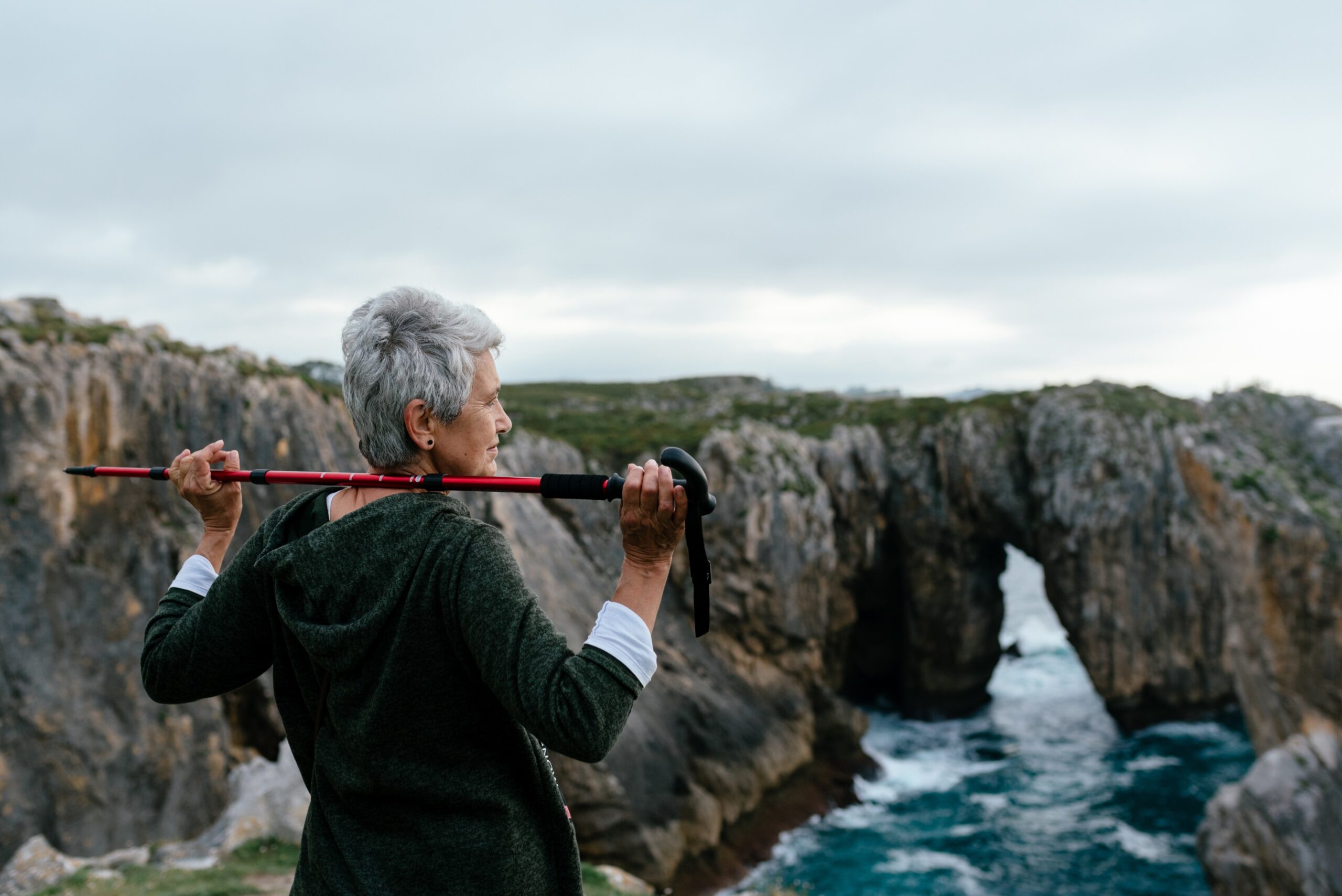


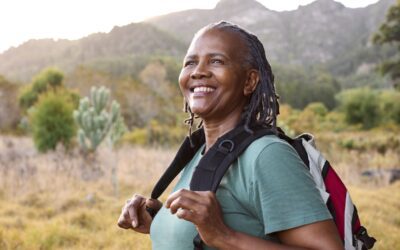
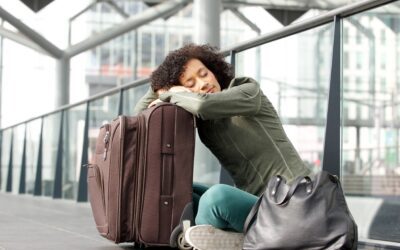

Very interesting results from your survey. None of the comments really surprised me. Happy to see that women are in charge of their travel destiny and plans. I’m 72 and have been to over 75 countries in my lifetime. There’s nothing better than travel to appreciate the world we live in.
I would be interested in smaller group tours…
Maybe 6-8 folks, rather then the 12-16 usually offered
Hello Barb, I so enjoy the small group tours, the camaraderie, care and fun we have. I also find we continue our friendship after the tour and recently had a lunch reunion with the some of the ladies who accompanied me on the Morocco tour.
I just returned from ten days in Greece with Insight Vacations. I completed your survey and find the results not surprising.
I needed permission from Insight to travel solo and finally was accepted after about a week – with the single supplement, of course. I found this process a bit humiliating. The company was reusable and both the time of the trip and the itinerary suited me. I loved not having to deal wiht accommodation, transfers, and handling luggage.
My biggest disappointment was that I was the fifth wheel, everyone was coupled. This was not a real problem because I enjoyed time alone. Curiously, everyone seemed to find me “courageous” in travelling alone. I have travelled much in my life, through work and on vacations. What’s next? Maybe trips closer to home during shoulder season and to areas less crowded.
Thanks for your newsletter. Eva 76 from Vancouver BC.
Great research and article Carolyn. The results make sense from everything I’ve been reading and hearing, as well as my own inclinations – except that I do like to travel close to the high season even if more costly because some of the best things are available or happen then – days are longer, water is warmer, major festivals and events take place, lighter clothing is needed so easier to pack small, etc. But I like things about the off-season as well. I think that the emergence of so many women’s group tours of all flavors and formats in recent years does show that more women are traveling and when they travel many like to do so in the company of other women. Its just fun to have dinners, activities, and social time with a group. It’s also nice and easy to take a group tour that is all set up and “turnkey” vs researching and planning everything all of the time. I have come around to this myself, having always planned my own travel, and like Barb above I prefer the smaller group tours.
I am 59 year old woman andnhave travel the world. Im looking to going to some places of the beaten path.
Hi Suzanne, check out our Less Travelled Places section on this website for inspiration: https://journeywoman.com/destinations/less-travelled-places/